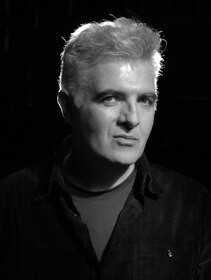This is an old revision of this page, as edited by Gamaliel (talk | contribs) at 17:08, 18 September 2015 ({{Primary source inline|date=September 2015}}). The present address (URL) is a permanent link to this revision, which may differ significantly from the current revision.
Revision as of 17:08, 18 September 2015 by Gamaliel (talk | contribs) ({{Primary source inline|date=September 2015}})(diff) ← Previous revision | Latest revision (diff) | Newer revision → (diff)
| Ariel Fernandez | |
|---|---|
 | |
| Born | (1957-04-08)April 8, 1957 Bahía Blanca, Argentina |
| Nationality | Argentinian |
| Citizenship | Argentina, USA |
| Alma mater | Yale University |
| Scientific career | |
| Fields | Biophysics, statistical mechanics |
| Thesis | Structural Stability of Chemical Systems at Critical Regimes (1984) |
Ariel Fernandez (born Ariel Fernández Stigliano, April 8, 1957) is an Argentinian–American physical chemist.
Early life, education and early career
Fernandez received a Licenciado degree in Mathematics from the Universidad Nacional del Sur, Argentina. He then earned a Ph.D. from Yale University in 1984 with a thesis entitled Structural Stability of Chemical Systems at Critical Regimes and was a senior researcher in the division of Nobel laureate Manfred Eigen at the Max Planck Institute for Biophysical Chemistry in Göttingen, Germany. He held the Karl F. Hasselmann Professorship of Bioengineering at Rice University. He is a member of the National Scientific and Technical Research Council (CONICET) in Argentina.
Career
Fernandez has published more than 250 articles and has an h-index of 25. His research spans representation theory, applied mathematics, molecular biophysics, statistical mechanics and bioinformatics.
He developed the concept of the dehydron, a structural feature in a protein consisting of an intramolecular hydrogen bond incompletely shielded from attack by water in the protein's solvation shell. Dehydrons cause "epistructural tension" in proteins and thus promote protein–protein interactions and protein–ligand associations. Fernandez is an inventor on a US patent for "wrapping technology", which uses the dehydron pattern to design small-molecule inhibitors for rational drug design.
Four of Fernandez's scientific papers have been questioned by journals that accepted them: BMC Genomics, Nature Publishing Group, Annual Reviews, and PLOS Genetics; One Proceedings of the National Academy of Sciences article has been retracted as an apparent duplicate publication.
Awards
Fernandez was awarded the Camille and Henry Dreyfus Distinguished New Faculty in 1989; the Camille and Henry Dreyfus Teacher-Scholar in 1991; a Guggenheim fellowship in 1995; and is an Elected Fellow, American Institute for Medical and Biological Engineering (2006).
Published works
- Transformative Concepts for Drug Design: Target Wrapping, by Ariel Fernandez (ISBN 978-3642117916, Springer-Verlag, Berlin, Heidelberg, 2010).
- Biomolecular Interfaces. Berlin, Heidelberg: Springer-Verlag. 2015. ISBN 9783319168494.
See also
- Oktay Sinanoğlu (Fernandez' dissertation advisor)
References
- ^ CV for Ariel Fernandez
- ^ Ariel Fernandez. Yale University Dissertation: Structural Stability of Chemical Systems at Critical Regimes (Dissipative Structures, Potential Energy Surfaces). Published/Created:1984
- "Administration and faculty" (PDF), Catalog 2010–2011, Rice University, retrieved 2014-12-02.
- Ariel Fernandez at CONICET (Argentine National Research Council)
- Profile for Ariel Fernandez on Scopus Page accessed 5 December 2014
- Ariel Fernandez Google Scholar Citations
- Fernández A, Scott R. Dehydron: a structurally encoded signal for protein interaction. Biophys J. 2003 Sep;85(3):1914-28. PMID 12944304 PMC1303363
- Philip Ball for Nature News. 18 May 2011 The Achilles' heel of biological complexity
- US Patent 8,466,154
- Kowalczuk MK et al. Expression of concern: subfunctionalization reduces the fitness cost of gene duplication in humans by buffering dosage imbalances BMC Genomics 2013, 14:260 Published: 17 April 2013
- Editorial Expression of Concern: Non-adaptive origins of interactome complexity
- Annual Review Of Genetics - Article Status
- Expression of Concern: Protein Under-Wrapping Causes Dosage Sensitivity and Decreases Gene Duplicability
- Retraction for Fernández et al., Packing defects as selectivity switches for drug-based protein inhibitors
- Ivan Oransky for Retraction Watch. January 9th, 2015 PLOS Genetics investigating paper by Ariel Fernandez
- Camille Dreyfus Teacher-Scholar Awards Program Past Awards
- "Ariel Fernández". Fellows. John Simon Guggenheim Memorial Foundation. Retrieved 27 September 2012.
- "College of Fellows". Members. American Institute for Medical and Biological Engineering. Retrieved 27 September 2012.
- "Ariel Fernandez Bibliography". Retrieved 25 February 2014.